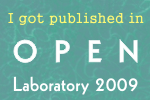If you haven’t read the transcript of Sean Eddy‘s recent talk “On High Throughput Sequencing for Neuroscience“, go ahead and read it. It’s full of many observations and insights into the relationships between computational and “wet” biology, and it is very well-written. I agree with many of his points, for example, that sequencing is not […]
Should DNA be subject to copyright law, rather than patent law? Section 101 of Title 35 U.S.C. sets out the subject matter that can be patented: Whoever invents or discovers any new and useful process, machine, manufacture, or composition of matter, or any new and useful improvement thereof, may obtain a patent therefor, subject to the […]
It has not escaped Twitter’s notice that the Watson & Crick paper is 60 years old today . Sorry, too busy to be really creative, so here is a repost from 2009. Think of it as a transposon. Short quiz and a movie for DNA day. 1) We celebrate DNA day because: a) Congress said so […]
About this time last year, I posted about a new course I was going to teach, Phage Genomics. Briefly: Phage isolation, electron microscopy, DNA sequencing in the first semester, annotation and comparative genomics in the second. And I get to teach the bioinformatics bit: annotation and comparative genomics. Woo-hoo! The great thing about this course, […]
I am fascinated with zombies. Always have been, but even more so since I took an interest in microbiology. The zombie apocalypse is the best known and best chronicled viral infection which hasn’t happened. But it could happen any day, so stock up on non-perishable food, medical supplies, water purification tablets, chainsaws, machetes, baseball […]
We will never look at life at quite the same way again. Until now, information flow in biology looked like this: DNA gets transcribed to RNA, wheich in turn is translated to protein. While reverse transcription does take place with retroviruses using reverse transcriptase, the central dogma of molecular biology held that […]
So here are EssOh and OhOne assembling a rather frustrating puzzle containing cows. The same 5-6 cow “characters” are repeated, which is a perfect way to illustrate low-complexity DNA sequences, and why they are hard to assemble, especially when the pieces are small, like those you get from some second generation sequencers.
catgaacgcgaataagcgcgcgaataaagcatggaataaaacatttgcgaataatttattcgcgaatggcgcaaaagc
cag·ey /ˈkājē/ (adjective) Reluctant to give information owing to caution or suspicion CAGI /ˈkājē/ (acronym) Critical Assessment of Genomic Interpretations. For details keep reading. The ability to sequence one’s genome adds a new dimension to the ancient maxim “know thyself”. What could be more revealing of one’s self than one’s own blueprint, explaining existing […]
So everybody is excited about the new GFAJ-1 bacterium that Felisa Wolfe-Simon and her colleagues have discovered. A common buzzphrase diffusing through the media and blogosphere is “NASA discovers a new life form“. (Or, better yet alien life.) Big press conference, and I just finished going through the article that Wolfe-Simon and colleagues have published in Science. Great […]
The central dogma of molecular biology edit: the sequence hypothesis (thanks for setting me straight, Kamel!) as formulated 57 years ago was simple: DNA is transcribed to mRNA,and mRNA is translated to proteins. Proteins are the business end of this process. mRNA is only the messenger: its sole function is to deliver information from the […]





